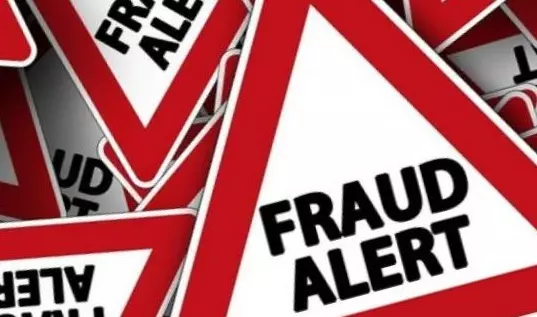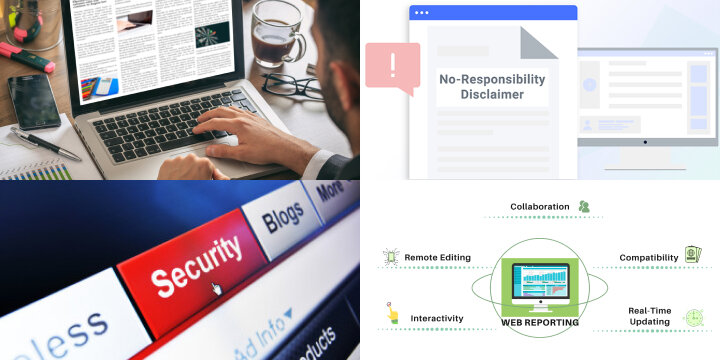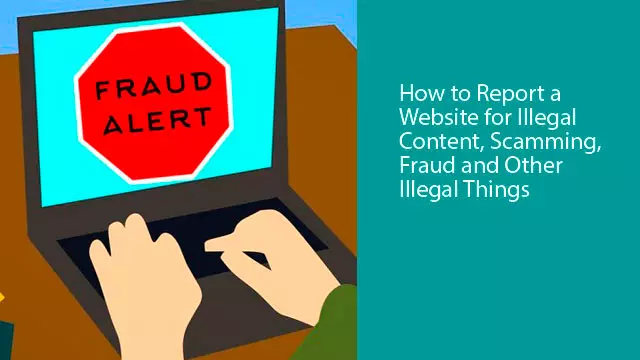Why report a website
The internet is a place and freedom which can be both a wonderful and dangerous thing. Since there is no single regulation body or set of rules, it is mostly meant to be self-regulated.
And that means two things: first that people take advantage of that freedom to do illegal things or try to scam you; second that we all have a responsibility to keep the internet a safe place for all. So if you stumble upon a fraudulent or illegal website or you are the victim of the scam, you should report it and prevent other people from being a victim.
Next we will see the different places you can report a website depending on the type of website you want to report.
First Response
If you have fallen prey to a scam website, your first and best response is to make the incident known. You may think turning to the police is the only answer, but there may be little your local department can do to help. While it is always important to file a report with your local authorities, you will also want to file a report with your regional reporting center.

Where to report a website
There are many different places to report a website depending on what it is you want to report. We made it easy for you and broke each section down in the rest of the article. But let’s start with a quick overview of the main places to report a website:
- econsumer.gov
- fraud.org
- The FTC
- Europol or the FBI for a crime
Note that these methods work to report even international websites.
Google is truly the godfather of the internet and, while their monopoly is sometimes bad news, when it comes to fraudulent website it means they will always have your back, no matter the type of website or fraud you encountered.
They have a whole website dedicated to educating and fighting this: safebrowsing.google.com. And that is why this guide will sometimes feel like a guide how to report a website to Googe.
econsumer.gov is a partnership between the consumer protection agencies of 35 countries around the world.
How to report a website
Let’s start with some general guidelines. First, you should note the website’s address (URL) and document as much information as possible on it. This includes a concise description of what happened, when it occurred, what law was breached, or what behavior was inappropriate. Y
ou should also document the type of scam, what services you expected versus what actually happened, whether or not you fell for it, what payment method you used if you did, and how you initially found the website. It’s always a good idea to take screenshots as well.
But remember, before reporting that website, you first priority should of course be to mitigate your personal damages and get in touch with your bank.
How to report a fraudulent website
Let’s start with the most “benign” form of fraudulent site: abusive or illegal ads. If it is a Google ad (and chances are it is), a good place to start is with Google itself. You can report the bad ad here: https://support.google.com/google-ads/troubleshooter/4578507.
The other big player in the ad world is Facebook. If you see a fraudulent ad, then click on the options next to the ad and click on “Report Ad”. To report anything you see on Facebook, you can also use this link: https://www.facebook.com/help/contact/423912757973851.

For any other type, you can report fraudulent websites to Google directly here:
https://www.google.com/webmasters/tools/spamreport. This includes webspam (pages that circumvents Google’s to get ranked higher), which you can report here: https://www.google.com/webmasters/tools/spamreport.
As well as paid links (pages that buy or sell links to artificially increase their rank), which you can report here: https://www.google.com/webmasters/tools/paidlinks. No matter what it is, don’t hesitate to report a bad website to google. Google is one of the best reporting.
In the US, there are a lot of tools to help you report fraudulent websites. So make sure to report the website to at least one of these:
- Report the site to your local FBI office at https://www.fbi.gov/contact-us/field/field-offices
- File a complaint with the Federal Trade Commission (FTC) here https://www.ftccomplaintassistant.gov
- Report a site to the Internet Crime Complaint Center (ICCC) https://www.ic3.gov/complaint/default.aspx
And of course do not forget www.econsumer.gov and www.fraud.org which we already mentioned earlier and which to apply everywhere. And if you have the time and/or want to be completely thorough, why not also involve Microsoft and report it here: https://www.microsoft.com/en-us/wdsi/support/report-unsafe-site-guest.
How to report a scam website
A scam site is pretty much a fraudulent site so everything in the previous section applies. Do note that if the scam involves investments or securities, then you should also report it to the Securities and Exchange Commission (SEC) here https://www.sec.gov/complaint/select.shtml.
Since Google’s safebrowsing site doesn’t have a “scam” section, you might be wondering how to report a scam website to Google or how to repot a cheaters website. Simply head over here: https://safebrowsing.google.com/safebrowsing/report_badware/
Top 10 scams by amount lost
| Scam category | Amount lost |
| Investment scams | $61 607 941,00 |
| Dating & romancce | $28 604 215,00 |
| False billing | $9 784 540,00 |
| Hacking | $5 139 414,00 |
| Online shoping scams | $4 839 952,00 |
| Remote access scams | $4 807 372,00 |
| Identity theft | $4 305 266,00 |
| Threats to life, arrest or other | $4 242 989,00 |
| Classified scams | $2 810 281,00 |
| Inheritance scams | $2 622 355,00 |
How to report a phishing website
The best place to start is to report the phishing site to Google. Head over here and report the site: http://www.google.com/safebrowsing/report_phish/.
Another great place to report it is with the APWG here https://apwg.org/reportphishing/. APWG stands for Anti Phishing Working Group and it is an international coalition of governments, industry actors, law enforcement and NGOs fighting cybercrime together. It’s as close as you get to a real-world version of The Avengers or The Justice League.

Next there is a whole list of good actors trying to keep phishing in check. If you have the time, it is also well worth your while as sites can get blocked within 15-20 minutes of you reporting them:
- Report it to Norton here https://submit.symantec.com/antifraud/phish.cgi
- Report it to Microsoft here https://www.microsoft.com/en-us/wdsi/support/report-unsafe-site
- Report it to McAfee here https://www.trustedsource.org/en/feedback/url
- Report it to Kasperky here https://virusdesk.kaspersky.com/
- Report it to CIRCL here https://www.circl.lu/urlabuse/
- Report it to NetCraft here http://toolbar.netcraft.com/report_url
How to report a malicious website
Again, the best place to start is report the malicious site to Google at this address: http://www.google.com/safebrowsing/report_badware/.
Often malicious sites are a form of phishing or scam, in which case please refer to the previous sections for further links and advice.
How to report a copyright infringement
This is bit trickier to know when it is worthwhile your time to report such a site, because the internet is unfortunately full of intellectual property crimes and there is a whole economy running on it.
In any case, it doesn’t take much of your effort to report it – once again! – to Google here: https://support.google.com/legal/troubleshooter/1114905.
Since a lot of these cases happen with products sold an Amazon, here is a direct link you can use for that situation: https://www.amazon.com/report/infringement
If you are just a good Samaritan and you are doing this without any personal stakes, then you might want to also get in touch with the real owners of the brand who is being stolen.
If the intellectual property crime causes direct damages to you then you probably want to go further and hire a lawyer. If you are in the US, then the US government can help as well. You can report such crimes here https://www.justice.gov/criminal-ccips/reporting-computer-internet-related-or-intellectual-property-crime and here https://www.copyright.gov/help/faq/faq-infringement.html.
In Europe you can report it here: https://europa.eu/youreurope/business/running-business/intellectual-property/infringement/index_en.htm.
How to report an illegal website
While there are countless ways for a site to be illegal and you might want to double-check that the site is indeed breaking the law. If it is or in case of doubt, don’t hesitate to report it. So how to report a website for illegal content? The best place to start is with the APWG (https://apwg.org/) which we have already mentioned.
If you are in the US then any illegal matter should be reported to the Internet Crime Complaint Center (http://www.ic3.gov/default.aspx) and/or to the FBI (http://www.fbi.gov/contact-us/field/field-offices).

In Europe you’ll want to report it to Europol here: https://www.europol.europa.eu/report-a-crime/report-illegal-content-on-the-internet or here: https://www.europol.europa.eu/report-a-crime/report-cybercrime-online.
And of course, why not report illegal website to Google, it can help take the website down faster: https://support.google.com/legal/troubleshooter/1114905.
How to report a website for inappropriate content
No matter what content you encountered, you can quickly report it to Google here: https://support.google.com/websearch/answer/510.
What if it is something serious? How to report a website for inappropriate content then? If you encountered Child Pornography or Exploitation then make sure to go to the authorities. In the US you should get in touch with your local FBI office (http://www.fbi.gov/contact-us/field/field-offices) and with the Internet Crime Complaint Center (http://www.ic3.gov/default.aspx).
Of course this constitutes a crime so you can also use all the information we covered in the previous section.
One other good place is the Internet Watch Foundation which dedicates itself to searching the internet to remove such content and provides a website for users to report it here: https://www.iwf.org.uk/.
Google Transparency Report
Google’s Transparency Report is usually more known when it comes to finding out how many government data collection requests it gets annually or for using one’s “right to be forgotten’. However it goes far beyond that. Not only is it a great initiative the transparency of the internet, but it’s also very practical if you report a website.
If Google finds that site to violet its policies, they will update the status of the website in their report. And of course your report will count towards their transparency report in a totally anonymous way. You can find the Google transparency report website here: https://transparencyreport.google.com/.
Let’s make a safer internet together
Hopefully this guide helped you find useful resources and links to report a website depending on what sort of fraudulent or illegal site it is. Remember that the internet is only as safe as we make it and that we all are its guardian. Do your part and report anything you see. It’s like cleaning litter on the street: it usually doesn’t take very long and it can do a big difference if we all do it.
Legal Consequences and Protections for Reporting a Website
Reporting a website for illegal content, scams, fraud, or other illicit activities is a responsible action that can contribute to a safer online environment. However, it’s crucial to understand the legal consequences and protections associated with such reporting:
Legal Protections:
- Whistleblower Laws: In many jurisdictions, individuals who report illegal activities on websites may be protected by whistleblower laws that shield them from retaliation.
- Good Samaritan Laws: Some countries have “Good Samaritan” laws that protect individuals who report illegal content in good faith from legal repercussions.
Legal Consequences:
- False Reports: Making false or malicious reports about a website can have legal consequences. It may lead to defamation, harassment, or other legal actions taken against the reporter.
- Privacy Laws: Reporting a website may involve sharing personal information or data. Ensure compliance with data protection and privacy laws.
- Evidence Preservation: Before reporting, consider preserving evidence of the website’s content, such as screenshots or URLs, to assist law enforcement if necessary.
- Anonymous Reporting: Many reporting mechanisms allow for anonymous reporting to protect the reporter’s identity.

Always research the specific laws and regulations in your jurisdiction and consult legal counsel if you have concerns about potential legal consequences when reporting a website. Responsible reporting contributes to a safer online ecosystem while staying within the boundaries of the law.
How to report a Website FAQ
- How do you report a website?
The first step is to determine what type of website you are reporting and why. Is it illegal, a scam, a copyright infringement issue, does it contain malware, does it publish your personal information or is it a phishing website? Next, refer to the relevant section in this article to find out where to report it.
- How do I report a website anonymously?
All you have to do is not provide your personal identity when using any of the links listed in our article. If you are paranoid, then you can use a VPN while in incognito mode (so that you are not logged into your Google account).
- How do I file a complaint against an online company?
If you are in the US, then the best place for this is the Federal Trade Commission (FTC). If you alert them on any wrongdoing, the FTC will carry out an investigation into the company. You can also use a website made for customer complaints such as this one: https://www.hissingkitty.com/index.php.
- Where do I report phishing sites?
There are two main places to report phishing: Google (http://www.google.com/safebrowsing/report_phish/?hl=en) and the APWG (https://apwg.org/reportphishing/). Our article goes into much further detail and gives additional ressources.



